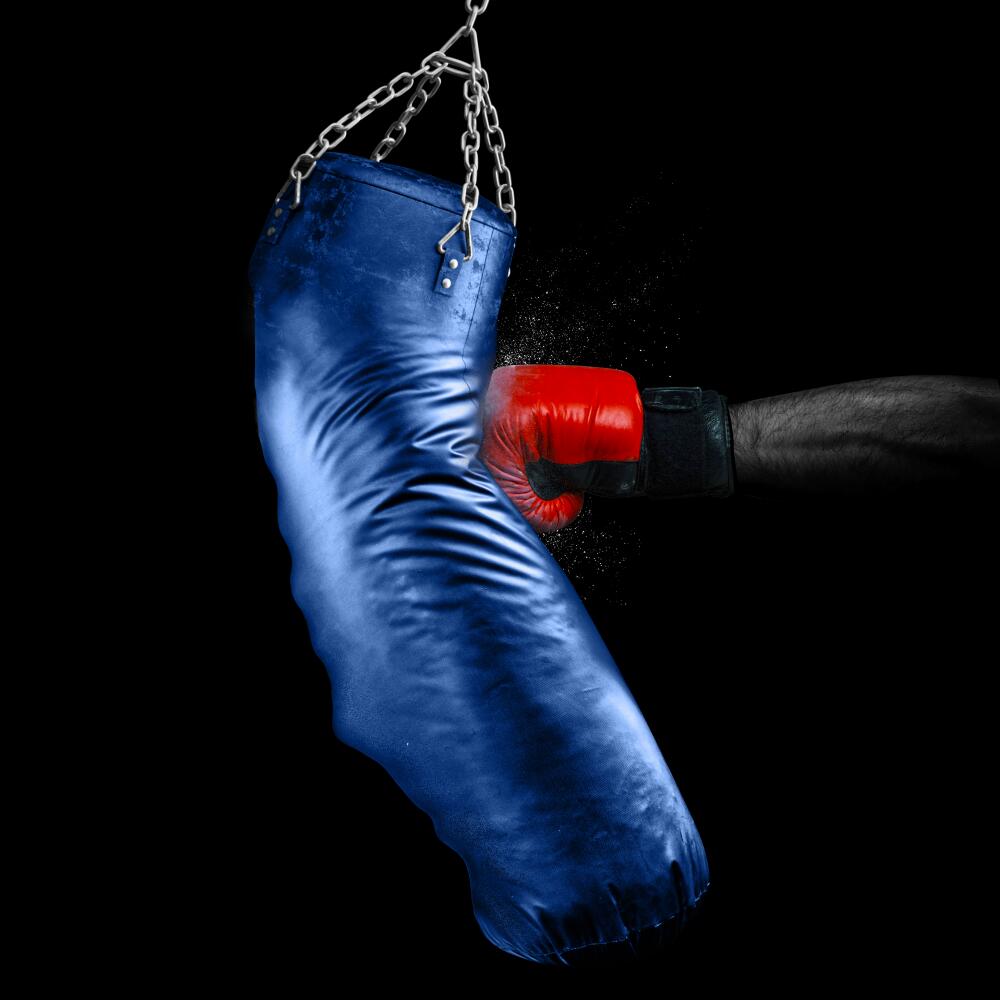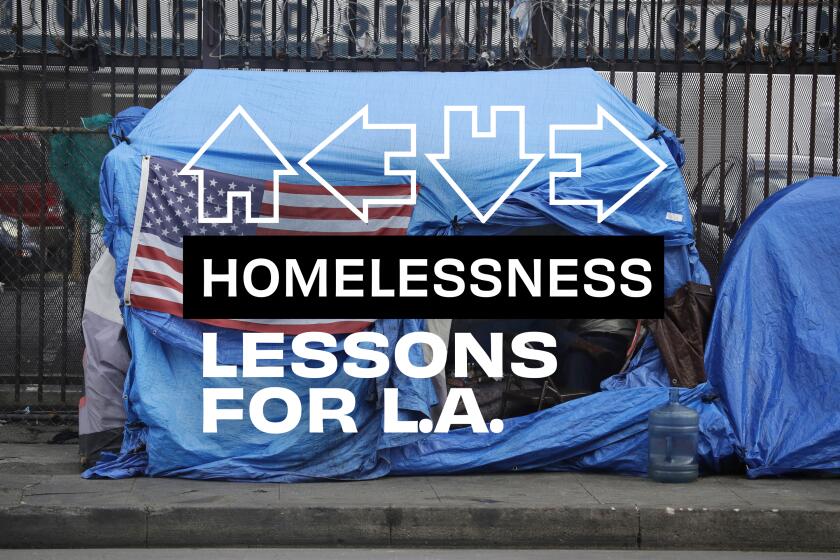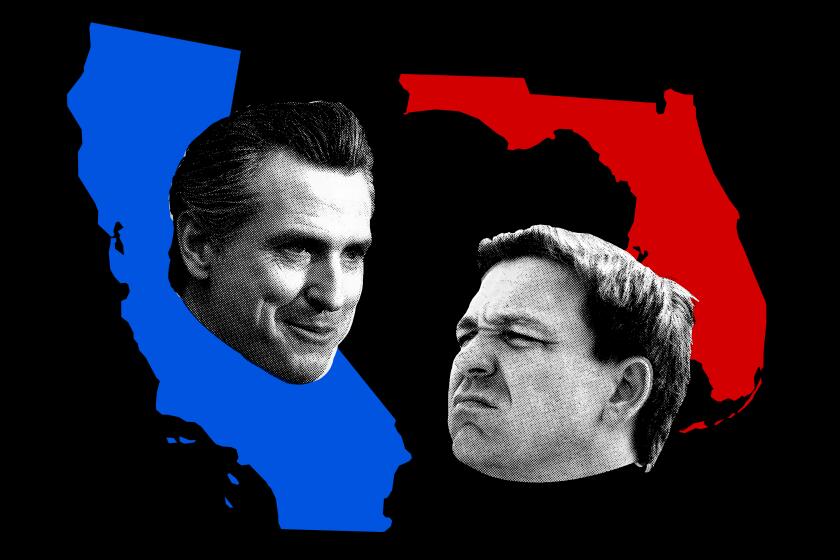
- Share via
For most of the 19th and 20th centuries, residents of the rest of the country often saw California as the place their wacky or adventurous or beautiful cousin went to seek gold, celebrity, sunny beaches, sexual freedom, and maybe a new identity, away from the family and the baggage in St. Paul, Philadelphia or Levittown.
Its current status as a punching bag for the right in a national culture war has taken decades to achieve.
For conservatives, the state’s glamorous image became tarnished in the 1960s and 1970s. They blasted Berkeley for its protesters and San Francisco for its hippies and gay life. Eastern elites mocked Los Angeles — at least the parts they saw in the movies — for its shallowness.
Former Democratic Gov. Jerry Brown earned a nickname in his first stint that surprised those who knew him but embodied a sense that the place was sort of kooky: Gov. Moonbeam.
The jabs were sometimes playful, sometimes acid, often overstated. But even if conservatives thought the Bay Area was too far-out, they still had Orange County’s megachurches, John Wayne’s westerns and Ronald Reagan.
That mix shifted dramatically in 1992.
The state’s voters chose a Democrat in a presidential election, Bill Clinton, for the first time since 1964, starting a blue streak that has yet to be reversed. Voters sent Barbara Boxer and Dianne Feinstein to the Senate, a pair of San Francisco Democrats headlining “the year of the woman” in politics.
California’s rapid growth yielded an unprecedented 52 members in the House, giving the state huge power in Congress. Much of that growth was powered by Latinos, who then made up about a quarter of the population and would soon become the state’s largest ethnicity.

Subscribers get exclusive access to this story
We’re offering L.A. Times subscribers special access to our best journalism. Thank you for your support.
Explore more Subscriber Exclusive content.
That same year, Pat Buchanan delivered a speech at the Republican National Convention that launched a cultural and religious war for “the soul of America,” citing California as a final, dystopian example of what could go wrong. Buchanan described a state where a judge condemned the town of Hayfork to “a sentence of death” to protect the spotted owl while a “mob” burned, ransacked and looted Los Angeles during that spring’s riots, terrifying old men and women, whose only hope was the National Guard.
More than 30 years later, even Buchanan’s broadside looks tame. The former insurgent presidential candidate was harsh but portrayed at least some Californians as victims and heroes. All were still Americans.
Today, by contrast, nearly half of Republicans nationwide, 48%, said California is “not really American” in a Leger poll conducted for the Los Angeles Times and released in February.
“Now, I think it’s part of the politicization of this country,” former Gov. Gray Davis said in an interview. “So if you’re a conservative, you’re not permitted to like California.”
::
The seeds of that division were planted in the mid-20th century when the state became a focal point for young people who challenged the rest of the country’s values.
“Some of it, from a conservative standpoint, was sort of positive: surf’s up, the Beach Boys and Reagan,” Newt Gingrich, the former Republican speaker, said in an interview.
“And then of course, there was Berkeley,” he said, as if spitting a curse word.
Unrest over Vietnam and civil rights, free love and gay liberation erupted around the Bay Area, fueled in part by Easterners who came seeking a break from society. San Francisco’s Haight-Ashbury became a destination that accepted all of it, including open drug use. Hollywood made antiwar movies and Marlon Brando turned his 1973 Oscar into a protest over Native American rights.
It seemed like another universe to Midwesterners such as Mike Royko, the late Chicago Tribune columnist who gave the nickname “Gov. Moonbeam” to Brown, then dating the singer Linda Ronstadt during his first stint as governor from 1975 through 1983.
“It was really a judgment about California as a place that was like counterculture, hot tub, granola, weed,” said Jim Newton, a former L.A. Times reporter and editor who wrote a biography of Brown and is now working on one about Jerry Garcia.
The reasons behind the evolution from “Moonbeam” to “not really American” are debatable, but the decline of the state’s image on the right can be traced to several factors:
- California’s oceans, sunshine, awe-inspiring national parks and world-ranked economy that includes Silicon Valley and Hollywood make it easy to resent in a time of grievance politics.
- The state’s large disparity in incomes coupled with the country’s biggest homeless crisis give critics ample images of desperate people camping on the streets.
- Its embrace of immigrants and changing ideas about gender and sexuality played on core fears on the right of a changing country.
- Union power and progressive policies on the environment are at odds with the Trump-era policy agenda.
- Statewide elections are increasingly out of reach for Republicans, reducing the downside of amped-up rhetoric.
In 1984, the Democratic Party’s decision to hold its national convention in San Francisco became contentious as the AIDS epidemic ramped up fear and prejudice against the city’s large gay population.
Gingrich recalled being interviewed, while standing in Union Square, about the contrast with the Republican convention in Dallas, a Bible Belt city, when “a 6’2” transvestite hands me an invitation to an exorcism of Jerry Falwell,” an influential conservative evangelical leader.
To Gingrich, it was a self-evident troll of a city that he believed had become too accepting of alternative lifestyles and a party that would alienate the rest of the country.
Former House Speaker Nancy Pelosi, who chaired the host committee, heard anxiety from fellow Democrats too, but held firm, assuring critics that no one could contract HIV/AIDS simply by visiting the city, and making the broader argument that the Bay Area’s inclusiveness was a point of pride.
“And yes, we will have our exuberance … the people speaking on the street, but we are a Democratic city,” she recalled. “We just have to make sure that we don’t get hijacked by Republicans, upsetting our events, as well as anarchists.”
::
The state was not wholly dismissed by conservatives, even if some of its cities were taking hits. Reagan, the Republican former governor, won California easily in both of his presidential elections and wrote in the final passage of his presidential diary how eager he was to return for “the start of our new life” in Bel-Air as he left the White House in 1989.
Reagan “loved, loved, loved California,” said Craig Shirley, author of four Reagan biographies. He “loved the ranch … loved Hollywood and all that.”
Two conservative Republicans, George Deukmejian and Pete Wilson, won governors’ races in the 1980s and 1990s. Wilson campaigned against the state’s taxes and regulations and didn’t mind if word spread beyond California’s borders.
“Tragically, it wasn’t Reagan’s California” by then, Wilson said in an interview. “It was not safe … and from a purely business standpoint, it was the last place because it cost so damn much.”
Wilson recalled a 1994 road trip he made with Democratic leaders to attract executives from Dallas, Minneapolis and Chicago.
One industrialist in Chicago thanked Wilson for breakfast and then laid into the business climate, Wilson said. “I wouldn’t come to California if you begged me,” Wilson recounted the man telling him.
Wilson was delighted by the negative reviews, which he used to validate his political case against Democrats.
“It’s what I expected and hoped to hear,” he said.
Why is homelessness so much worse in Los Angeles than in other parts of the country, even as other cities also combat poverty, drug addiction and crime?
Wilson’s support in 1994 for Proposition 187, a ballot measure that denied many public services to immigrants living in the country illegally, foreshadowed the national debates over immigration that still rage. It also created a backlash that gave Democrats a near impenetrable advantage in statewide elections and still rankles Wilson, 90.
“Every effort was made to make it play that role by the Democratic Party. And I will tell you that racism is a very ugly charge,” Wilson said. “If it’s warranted, that’s one thing. If it isn’t, that is just inexcusable.”
That same ballot measure prompted Sen. Alex Padilla, a Los Angeles Democrat, to give up his career as an engineer, fresh out of MIT, to enter politics. In an interview, he called Proposition 187 “a wake-up” call for thousands of immigrants, including his parents, legal residents who became citizens and gained the right to vote.
Padilla began registering voters in 1996. “They’re asking the question, ‘Should I register as a Democrat or Republican?’” he recalled. “And you can talk about the platform, but the way it was really easy to describe was, ‘Well, Pete Wilson’s a Republican; Bill Clinton is a Democrat.”
The resulting influx of Latino Democrats moved the electorate and the people they elected in a leftward direction.
The growing population and influence of Latino voters also influenced outside opinions, in Padilla’s opinion.
“Above the surface it’s pointing to California’s policy leadership,” he said of the anti-California critiques from the right. “But I do think subliminally it is pointing to diversity.”
Views of the state continued to diverge, but its population and economic clout grew, posing a bipartisan problem in Washington.
“Everybody thought we were the golden place,” said Boxer, who served in the House and Senate from 1983 to 2017. “They didn’t want to step up when we had problems.”
The motto of the other 49 states became known as ABC: Anywhere But California. That dismissal of the state may have hit its nadir in 1986 when a $50-million federal center for earthquake research was given to Buffalo, N.Y., which hadn’t had an earthquake since 1929, instead of Berkeley, along the Hayward fault.
“We used to say to all our colleagues, ‘You come here to raise money, whether you’re Republicans or Democrats,’” Boxer recalled. “‘You come here, you raise money and you bash us.’”
::
In more recent decades, however, the fight has shifted from disputes over state taxes and federal spending to the culture war.
The change began in the 2000s, as the GOP increasingly reflected the values of its large conservative, evangelical Christian faction, then accelerated during the Trump years as California repeatedly challenged conservative federal policies in court. Gov. Arnold Schwarzenegger, a moderate Republican who led the state from 2003 through 2011, offered only a mild reprieve.
Newsom, after becoming governor in 2019, embraced the fight, placing provocative ads in red states as he promoted laws granting sanctuary for women obtaining abortions and transgender youths seeking gender-affirming care. California granted Medicaid access to people who came to the country illegally while setting an even more aggressive environmental agenda.
“We’re the opposite of MAGA,” Boxer said.
The state also became increasingly hard to afford, creating a wider gap between the new class of Silicon Valley tech barons and the huge, largely Black and Latino working class.
Newton, the Brown biographer, argued that the difference between the early caricatures of the state and the new harder-edged critiques can be traced to Brown’s second stint as governor — from 2011 through 2019 — when he answered critics who said California could not be governed. His ability to tame the budget while creating left-leaning policies on immigration and the environment posed a serious threat to the ideology of the Trump era, he said: If California was successful, that meant the Make America Great Again rhetoric was wrong.
For the MAGA movement, today’s California is a diorama of a failed state, an obvious foil that can be deployed on campaign fliers in Minnesota and Georgia featuring Pelosi’s scowling face, Vice President Kamala Harris’ laugh or Newsom’s grin. One Fox host declared voters’ choices so reprehensible that he “stopped caring about Californians.”
“Consider the source,” Pelosi said. “They don’t believe in science. They don’t believe in governance. They don’t believe in a woman’s right to choose. They don’t believe in LGBTQ rights.”
Florida’s Republican Gov. Ron DeSantis, in a last-ditch attempt to wrestle the 2024 presidential nomination from former President Trump, tried to recharge his campaign with descriptions of drug-addled homeless people defecating on San Francisco’s streets, before agreeing to a televised showdown with Newsom in which he declared the state “failed because of his leftist ideology.”
Move over, Texas. Florida has quickly become California’s political doppelganger.
“Even though California was always considered a high-tax and high cost-of-living state, it was still the place to be,” said Frank Luntz, a pollster who helped Republicans craft language for several decades with polls and focus groups, and then used some of his earnings for a home in Los Angeles. “With the explosion of homelessness and crime and the deterioration of the quality of life, it has now become a symbol of what’s wrong with the left.”
The reputation has become so toxic on the right that even candidates in the state are running against California. Rep. Mike Garcia, a Santa Clarita Republican, recently blasted a campaign email with an article he wrote for Fox News titled, “How to prevent the Californication of America,” in which he argued that the rest of the country could “learn from California’s mistakes” in going soft on crime.
Three-quarters of Republicans nationally see the state as unsafe and they are far less likely than Democrats to think it is a good place to visit or has a better natural environment than other parts of the country, one of several indications the negative views have seeped into nearly all aspects of California’s reputation.
“I don’t think it’s just the far-right MAGA,” said Kenneth Khachigian, a California-based consultant who worked for Presidents Nixon and Reagan. “There’s a lot of reasonable conservatives and Republicans that feel California’s gone off the rails.”
Gingrich, however, doesn’t think California will remain a focus in conservative media. The world moves on to other culture war targets.
Ivy League schools are a better punchline these days, Gingrich said. And don’t forget about New York.
More to Read
Sign up for This Evening's Big Stories
Catch up on the day with the 7 biggest L.A. Times stories in your inbox every weekday evening.
You may occasionally receive promotional content from the Los Angeles Times.












